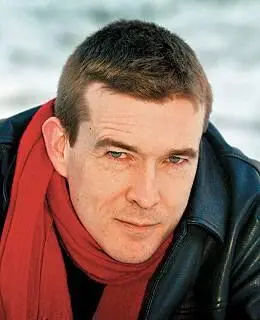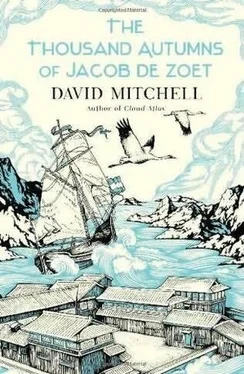‘Take as long as it takes. It’ll… it’ll keep the chill from my chest.’
‘Very good, sir.’ Boerhaave walks to the main hatch and goes below.
Yûan’s outline is losing definition against the backdrop of Nagasaki.
Jacob prays, and shall pray nightly, that Yûan’s life will be better than that of Thunberg’s tubercular son, but the ex-Chief is well versed in Japan’s distrust of foreign blood. Yûan may be his master’s most gifted pupil, but he shall never inherit his master’s title, or marry without the Magistrate’s permission, or even leave the wards of the city. He is too Japanese to leave, Jacob knows, but not Japanese enough to belong.
A hundred wood-pigeons scatter from a spur of beech trees.
Even letters must rely upon the fair-mindedness of strangers. Replies will take three or four or five years.
The exiled father rubs an eyelash from his wind-blurry eye.
He stamps his feet against the early cold. His kneecaps complain.
Looking backwards, Jacob sees pages from the months and years ahead. Upon his arrival at Java, the new Governor-General summons him to his palace in salubrious Buitenzorg, inland and high above the miasmic airs of Batavia. Jacob is offered a plum job in the new Governorship, but he declines, citing his desire to return to his fatherland. If I cannot stay in Nagasaki, he thinks, better to turn my back on the Orient altogether. The following month, he watches nightfall smother Sumatra from a ship bound for Europe, and hears Dr Marinus, clear as a harpsichord’s spindly refrain, remark upon the brevity of life, probably in Aramaic. Naturally, this is a trick of his mind. Six weeks later the passengers see Table Mountain rear up behind Cape Town, where Jacob recalls fragments of a story narrated by Chief van Cleef on the roof of a brothel, long ago. Ship fever, a brutal storm off the Azores and a brush with a Barbary corsair make the Atlantic leg more arduous, but he disembarks safely in the Texel roadstead in a hailstorm. The Harbour Master presents Jacob with a courteous summons to The Hague where his distant role in the War is recognised by a brief ceremony at the Department for Trade and the Colonies. He proceeds to Rotterdam, and stands on the same quay where he once made a vow to a young woman called Anna that within six years he would return from the East Indies, with his fortune made. He has money enough now, but Anna died in childbirth long ago, and Jacob boards the daily packet to Veere on Walcheren. The windmills on his war-bruised native island are rebuilt and busy. Nobody in Veere recognises the homecoming Domburger. Vrouwenpolder is only half an hour’s ride by trap, but Jacob prefers to walk, so as not to disturb the afternoon classes at Geertje’s husband’s school. His sister opens the door when he knocks. She says, ‘My husband is in his study, sir, would you care to-’ then her eyes widen, and she begins to weep and laugh.
The following Sunday, Jacob listens to a sermon in Domburg Church amongst a congregation of familiar faces as aged as his own. He pays his respects at the graves of his mother, father and uncle, but declines the new pastor’s invitation to dine at the parsonage. He rides to Middelburg for meetings with the directors of trading houses and import companies. Positions are proposed, decisions taken, contracts signed, and Jacob is inducted into the Freemasons’ Lodge. By tulip-time and Whitsuntide, he emerges from a church arm in arm with the stolid daughter of an associate. The confetti reminds Jacob of the cherry blossoms in Miyako. That Mrs de Zoet is half her husband’s age provokes no disapproval – her youth is an equitable exchange for his money. Man and wife find one another’s company agreeable; for most of the time; or certainly, for some of it; during the earlier years of their marriage, at least. He intends to publish his memoirs about his years as Chief Resident in Japan, but somehow life always conspires to rob him of the time. Jacob turns fifty. He is elected on to the council of Middelburg. Jacob turns sixty, and his memoirs are still unwritten. His copper hair loses its burnish, his face sags and his hairline retreats until it resembles an elderly samurai’s shaven pate. A rising artist who paints his portrait wonders at his air of melancholic distance, but exorcises the ghost of absence from the finished painting. One day Jacob bequeaths the de Zoet Psalter to his eldest son – not Yûan, who predeceased him, but his eldest Dutch son, a conscientious boy quite untroubled by curiosity about life beyond Zeeland. Late October or early November brings a gusty twilight. The day has stripped the elms and sycamores of their last leaves, and the lamplighter is making his rounds as Jacob’s family lines the patriarch’s bedside. Middelburg’s best doctor wears a grave demeanour, but he is satisfied that everything was done for his patient during the short but lucrative illness, and that he will be home in time for supper. The clock’s pendulum catches the firelight, and in the rattle-breathed final moments of Jacob de Zoet, amber shadows in the far corner coagulate into a woman’s form.
She slips between the bigger, taller onlookers, unnoticed…
… and adjusts her headscarf, the better to hide her burn.
She places her cool palms on Jacob’s fever-glazed face.
Jacob sees himself, when he was young, in her narrow eyes.
Her lips touch the place between his eyebrows.
A well-waxed paper door slides open.
Firstly, the author wishes to thank the Netherlands Institute of Advanced Study in the Humanities and Social Sciences and the Dutch Fund for Literature for providing an invaluable residency at NIAS for the first half-year of 2006.
Secondly, general thanks to Nadeem Aslam, Piet Baert, Manuel Berri, Evan Camfield, Wayson Choy, Harm Damsma, Walter Donohue, David Ebershoff, Johnny de Falbe, Tijs Goldschmidt, Tally Garner, Henry Jeffreys, Jonny Geller, Trish Kerr, Martin Kingston, Sharon Klein, Tania Kuteva, Hari Kunzru, Jynne Martin, Niek Miedema, Cees Nooteboom, Al Oliver, Hazel Orme, Lidewijde Paris, Jonathan Pegg, Noel Redding, Michael Schellenberg, Mike Shaw, Alan Spence, Doug Stewart, Ruth Tross, Professor Arjo Vanderjagt, Klaas and Gerrie de Vries, Carole Welch my patient editor, Professor Henk Wesselling, Dr George E van Zanen.
Thirdly, specific thanks to Kees ’t Hart, Ship Manager Robert Hovell of HM Frigate Unicorn in Dundee, Archivist Peter Sijnke of Middelburg and Professor Cynthia Vialle of the University of Leiden for answering a plethora of questions. Research sources were numerous, but this novel is indebted especially to the scholarship of Professor Timon Screech of the School of Oriental and African Studies at the University of London, Beatrice M. Bodart-Bailey’s annotated translation of Kaempfer’s Japan: Tokugawa Culture Observed (as read by Captain Penhaligon) and Annick M. Doeff’s translation of her ancestor Hendrik Doeff’s memoir, Recollections of Japan.
Fourthly, thanks to the in-house illustrators Jenny and Stan Mitchell, and in-house translator of Japanese sources Keiko Yoshida.
Lastly, thanks to Lawrence Norfolk and his family.

***















